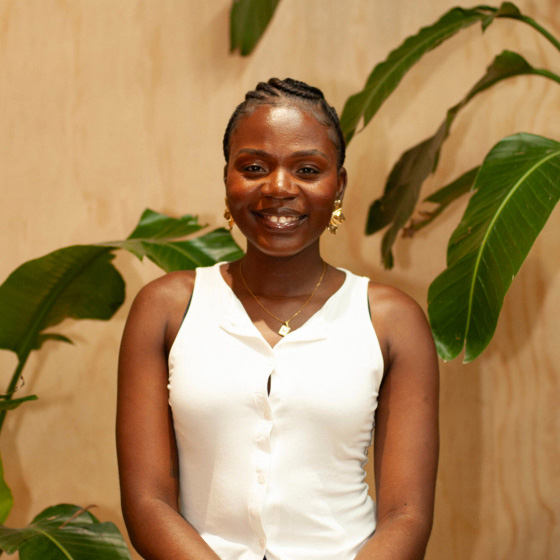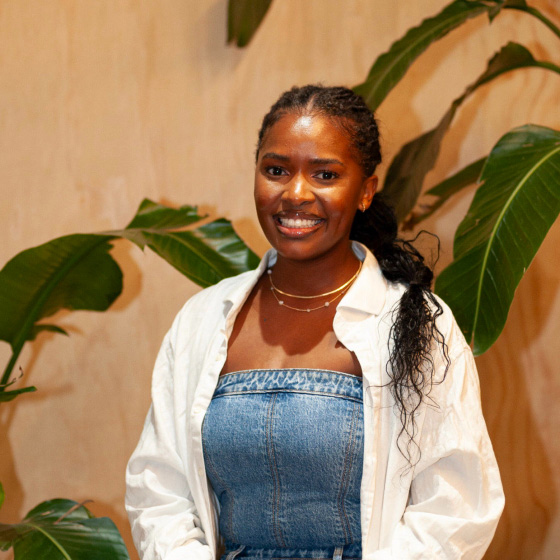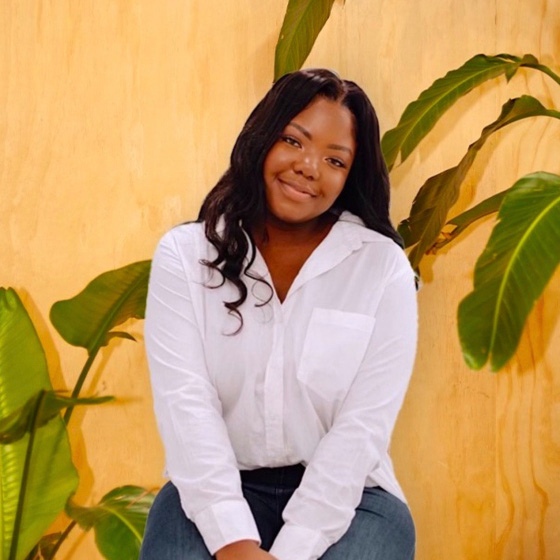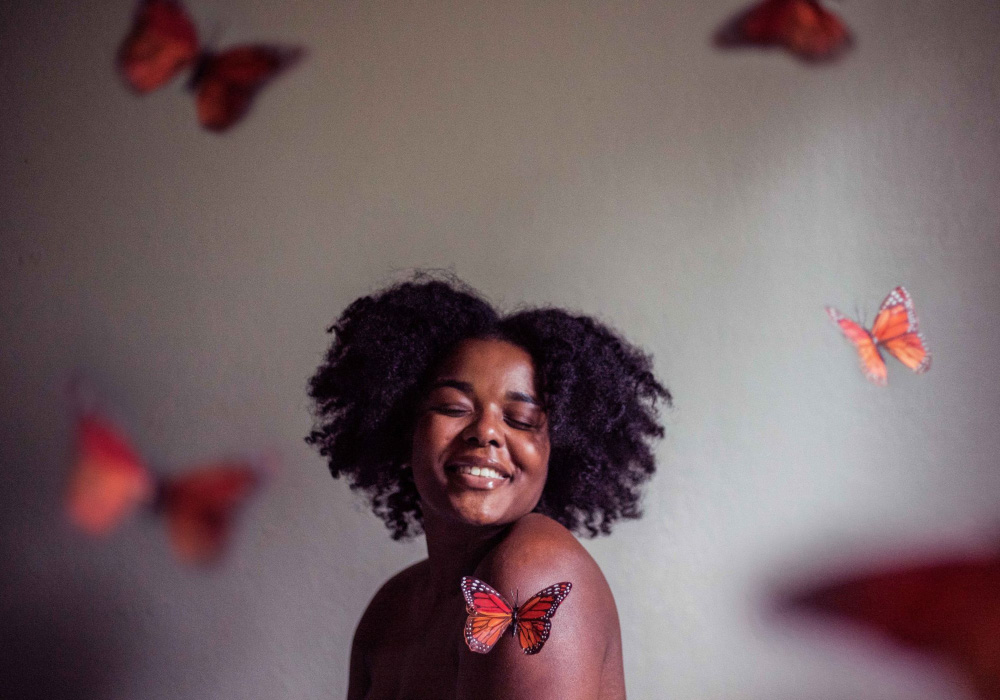Born out of the loneliness of being international students in Canada, Hey Black Girl has grown into a vital platform for Black women. Through mentorship, financial literacy, and menstrual equity initiatives, the nonprofit is shaping futures in Canada and beyond.
When Martina Mbadinga arrived in Canada as a young international student, she quickly felt the weight of navigating adulthood without a village to guide her. Questions about credit cards, job applications, internships, and even how to manage a student meal plan were overwhelming. Together with fellow international students and now co-founders Tanaka and Angela, she relied on peer support to navigate milestones both big and small.
That informal network of encouragement and shared knowledge eventually grew into something larger: Hey Black Girl (HBG), a Black-led, feminist, climate-conscious nonprofit dedicated to creating safe spaces for Black women and gender-diverse people. What started as three women leaning on each other evolved into a movement to fill systemic gaps in mentorship, financial literacy, and professional development for young Black women across Canada.
“We thought, if we feel this way, surely thousands of others do too,” Martina told AfroToronto. “So why not extend the community we built for ourselves to others?”
Merging skills for impact
Each founder brought unique skills to the table. Martina, who studied pre-law and African Studies at York University, built empathy and crisis management expertise through her work in insurance claims. Angela, a practicing lawyer, brings legal expertise and negotiation skills. Tanaka, with a background in nonprofit management, leads on grant applications and funding strategies.
 |
 |
 |
Together, they treat Hey Black Girl as their “baby,” drawing on their professional expertise, lived experiences, and an unwavering belief in its mission. This collective approach reflects what grassroots leadership often looks like—practical, heart-driven, and deeply personal.
Aligning with global goals
Hey Black Girl’s programming aligns with the United Nations Sustainable Development Goals (SDGs), particularly:
- SDG 4 – Quality Education: through mentorship and professional development workshops.
- SDG 5 – Gender Equality: by creating spaces where Black women are supported by peers and role models who share their lived experiences.
- SDG 10 – Reduced Inequalities: addressing systemic barriers in healthcare, financial literacy, and education.
Even seemingly small details—such as avoiding balloons at events and using recyclable decorations—reflect their climate-conscious mandate. By combining cultural relevance with sustainability, HPG positions itself as both locally impactful and globally aware.
Tackling newcomer challenges
Martina and her co-founders often draw from their personal struggles as international students. For many young Black women arriving in Canada, financial literacy is a critical barrier. Credit systems, banking, and budgeting are unfamiliar, and mistakes can have long-term consequences.
Through Project Up!, HBG offers workshops on financial literacy, budgeting, and investing. Martina emphasizes that it’s never too early to start: “The earlier you get on it, the better your relationship with money will be.”
Mental health is another focus. Coming from cultures where the subject was rarely discussed, Martina struggled with seasonal depression as a student. Today, HBG normalizes these conversations, connecting participants with Black mental health professionals and fostering a culture of openness.
Accessible and inclusive programming
HBG runs virtual workshops to ensure accessibility across Canada, with occasional in-person gatherings in Toronto. Sundays became their anchor day, allowing participants—from students to working professionals—to carve out time for growth without pressure.
Their demographics are primarily women aged 21–28, but their geographic reach is expanding. Interest has come from Black communities in Winnipeg, Edmonton, and Montreal. As Martina, who is bilingual in French, explained: “It’s important to make this programming accessible to Francophone communities as well.” Future plans include offering workshops in French to better serve Montreal’s Black population.
Menstrual equity: Breaking taboos
One of Hey Black Girl’s flagship causes is menstrual equity. Despite living in a wealthy country like Canada, many young women face period poverty, with menstrual products often costing $20 or more per package. Globally, the problem is even more dire: over 500 million people lack access to safe, affordable menstrual products.
HBG has distributed more than 2,000 reusable menstrual products in Canada and Zimbabwe. They also run workshops with healthcare professionals to educate young women on menstrual hygiene and product use.
Their advocacy challenges stigma, particularly in African and immigrant households where menstruation is still a taboo subject. By reframing it as a matter of dignity and equality, HBG is helping normalize conversations that should have always been part of community and family life.
“There’s nothing scary about it. There’s nothing to be embarrassed about,” Martina stressed. “The more we talk about it, the more normalized the topic becomes.”
Upcoming events include a Menstrual Equity awareness program at Toronto City Hall, further elevating this advocacy into civic spaces.
Building partnerships and support
Running a nonprofit requires both passion and resources. HBG has built partnerships with local businesses by offering visibility at events in exchange for support. On the institutional side, grants—from provincial to federal—have been crucial in scaling programming.
Martina is clear, however, that exposure and trust-building are as important as financial support. “The no you get today may not be a no forever,” she explained, stressing the importance of persistence and long-term relationship building.
Looking ahead: From Toronto to Africa
While Toronto remains HPG’s base, Martina dreams of taking the initiative “back home.” As a Congolese woman, she sees firsthand the urgent needs in her community whenever she returns to the Democratic Republic of Congo.
Her vision is to create Hey Black Girl chapters across Africa, starting in the home countries of the three co-founders: Congo, Zimbabwe, and Kenya. Eventually, the team hopes to establish its headquarters in Africa and transition into full charitable status, ensuring sustainable funding and a greater impact.
“It’s always a shock when I go back home and see the needs,” Martina said. “I want to take everything I’ve learned here and implement it where I come from.”
Conclusion
Hey Black Girl is more than an organization—it is a safe space where Black women can learn, connect, and thrive. By centring lived experiences, HBG addresses systemic gaps while promoting dignity and empowerment. From financial literacy workshops to menstrual equity campaigns, their work is reshaping how Black women access resources, mentorship, and representation.
As they expand their programming across Canada and begin forging connections in Africa, the vision remains consistent: build pathways where Black women are visible, supported, and celebrated. Whether through Instagram updates, workshops, or global partnerships, HPG is planting seeds for a future where every Black woman has the tools to succeed.
For those interested in learning more or getting involved, visit heyblackgirl.ca or follow them on Instagram @heyblackgirlca for updates on upcoming events, including the anticipated Hey Black Girl Fest this fall.
References & Resources
- Hey Black Girl official website: heyblackgirl.ca
- UN Sustainable Development Goals: sdgs.un.org






Comments powered by CComment